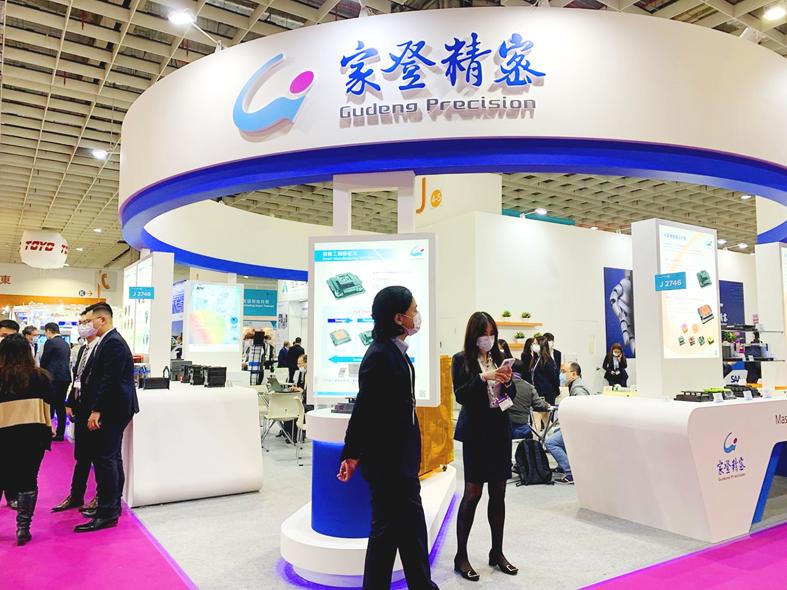Gudeng Precision Industrial Co (家登), the sole supplier of extreme ultraviolet (EUV) pods to Taiwan Semiconductor Manufacturing Co (TSMC, 台積電), yesterday said it is looking at setting up a factory in the US to align itself with TSMC’s capacity expansion there.
Gudeng is one of several TSMC suppliers that are considering following their customer in setting up operations in the US to provide on-site services.
TSMC is building a 12-inch fab in Phoenix, Arizona, for an initial investment of US$12 billion. It plans to produce 20,000 wafers a month using 5-nanometer technology when the fab becomes operational in 2024.

Photo: Grace Hung, Taipei Times
TSMC uses EUV tools extensively in the production of chips using 5-nanometer technology and plans to use it to make 3-nanometer chips.
Gudeng chairman Bill Chiu (邱銘乾) told a media briefing in Taipei that the company is in no hurry to build a plant in the US, given the small scale of TSMC’s capacity expansion in the US at this stage.
TSMC’s Arizona fab is to have installed capacity of 20,000 wafers a month, which is only one-fifth of 100,000 wafers at TSMC’s advanced factories at home.
“However, it is only a matter of time for Gudeng to build a presence in the US,” Chiu said, adding that semiconductor production has become a national security issue, which might constitute a trade barrier.
Building a localized supply chain, rather than cost efficiency, has become the top priority for semiconductor companies when selecting new factory sites, as the COVID-19 pandemic has upended the normal production and supply of components and raw materials, Chiu said.
“This [building localized supply chains] will be the top priority for us in the next three to five years,” he said.
Gudeng is looking to form an alliance with local semiconductor equipment manufacturers and raw material suppliers to minimize the risk of supply disruptions, Chiu said.
Before it builds capacity in the US, Gudeng is arranging several of its employees to work at its US office to provide on-site services to customers, Chiu said.
The employees are waiting for their working visa applications to be approved, he said.
Gudeng controls about 70 percent of the world’s EUV pod market, with TSMC and Intel Corp topping its customer list.
TSMC, Intel and Samsung Electronics Co are the world’s only three semiconductor companies that can afford the expensive EUV tools made by ASML Holding NV.
China is also trying to enter the advanced chip manufacturing market via Huawei Technologies Inc (華為), an industry insider said.
Huawei wants Gudeng to build a production line in China to back a chip manufacturing fab, the person said.
Gudeng yesterday gave an optimistic outlook for next year, thanks to strong demand for EUV pods and wafer front opening unified pods (FOUPs).
Gudeng said it has landed a big order to supply wafer FOUPs to the nation’s biggest semiconductor company next year and expects demand for EUV pods to rise rapidly after TSMC starts ramping up 3-nanometer technology in the second half of next year.
During the first 11 months of this year, Gudeng’s revenue surged 26.54 percent to NT$2.72 billion (US$98.24 million), compared with NT$2.15 billion in the same period last year.

South Korea’s equity benchmark yesterday crossed a new milestone just a month after surpassing the once-unthinkable 5,000 mark as surging global memory demand powers the country’s biggest chipmakers. The KOSPI advanced as much as 2.6 percent to a record 6,123, with Samsung Electronics Co and SK Hynix Inc each gaining more than 2 percent. With the benchmark now up 45 percent this year, South Korea’s stock market capitalization has also moved past France’s, following last month’s overtaking of Germany’s. Long overlooked by foreign funds, despite being undervalued, South Korean stocks have now emerged as clear winners in the global market. The so-called “artificial intelligence

‘SEISMIC SHIFT’: The researcher forecast there would be about 1.1 billion mobile shipments this year, down from 1.26 billion the prior year and erasing years of gains The global smartphone market is expected to contract 12.9 percent this year due to the unprecedented memorychip shortage, marking “a crisis like no other,” researcher International Data Corp (IDC) said. The new forecast, a dramatic revision down from earlier estimates, gives the latest accounting of the ongoing memory crunch that is affecting every corner of the electronics industry. The demand for advanced memory to power artificial intelligence (AI) tasks has drained global supply until well into next year and jeopardizes the business model of many smartphone makers. IDC forecast about 1.1 billion mobile shipments this year, down from 1.26 billion the prior

People stand in a Pokemon store in Tokyo on Thursday. One of the world highest-grossing franchises is celebrated its 30th anniversary yesterday.

Chinese artificial intelligence (AI) start-up DeepSeek’s (深度求索) latest AI model, set to be released as soon as next week, was trained on Nvidia Corp’s most advanced AI chip, the Blackwell, a senior official of US President Donald Trump’s administration said on Monday, in what could represent a violation of US export controls. The US believes DeepSeek will remove the technical indicators that might reveal its use of American AI chips, the official said, adding that the Blackwells are likely clustered at its data center in Inner Mongolia, an autonomous region of China. The person declined to say how the US government received